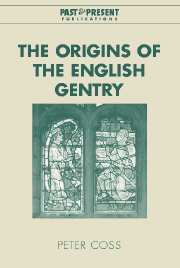Book contents
- Frontmatter
- Contents
- List of illustrations
- Preface
- 1 The formation of the English gentry
- 2 The roots of the English gentry
- 3 The Angevin legacy: knights as jurors and as agents of the state in the reign of Henry III
- 4 The crisis of the knightly class revisited
- 5 Knights in politics: minor landowners and the state in the reign of Henry III
- 6 Knighthood, justice and the early Edwardian polity
- 7 The explosion of commissions and its consequences
- 8 Identity and the gentry
- 9 Knights, esquires and the origins of social gradation in England
- 10 Crystallisation: the emergence of the gentry
- Appendices
- Bibliography
- Index
- Past and Present Publications
1 - The formation of the English gentry
Published online by Cambridge University Press: 10 December 2009
- Frontmatter
- Contents
- List of illustrations
- Preface
- 1 The formation of the English gentry
- 2 The roots of the English gentry
- 3 The Angevin legacy: knights as jurors and as agents of the state in the reign of Henry III
- 4 The crisis of the knightly class revisited
- 5 Knights in politics: minor landowners and the state in the reign of Henry III
- 6 Knighthood, justice and the early Edwardian polity
- 7 The explosion of commissions and its consequences
- 8 Identity and the gentry
- 9 Knights, esquires and the origins of social gradation in England
- 10 Crystallisation: the emergence of the gentry
- Appendices
- Bibliography
- Index
- Past and Present Publications
Summary
In his first foray into the question as to whether there had ever been a peasant society in England Alan Macfarlane distinguished between on the one hand the common-sense or dictionary definition of peasant (‘countryman, rustic, worker on the land’) and on the other the technical meaning of the term. In order to facilitate comparative study and in particular to answer the question whether England was in fact a peasant society, Macfarlane attempted to construct an ‘ideal-type’ model in the Weberian sense. In his defence of his methodology he repeats Weber's advice: ‘Hundreds of words in the historian's vocabulary are ambiguous constructs created to meet the unconsciously felt need for adequate expression and the meaning of which is only concretely felt but not clearly thought-out.’ And again, ‘If the historian … rejects an attempt to construct such ideal types as a “theoretical construction”, i.e. as useless or dispensable for his concrete heuristic purposes, the inevitable consequence is either that he consciously or unconsciously uses other similar concepts, without formulating them verbally and elaborating them logically or that he remains stuck in the realm of the vaguely “felt”.’ Despite such warnings, historians are often suspicious of model-building, suspecting that it may fail to locate the dynamics of a specific society and that it may cause the observer to distort his analysis in order to remain within his given framework.
- Type
- Chapter
- Information
- The Origins of the English Gentry , pp. 1 - 19Publisher: Cambridge University PressPrint publication year: 2003



